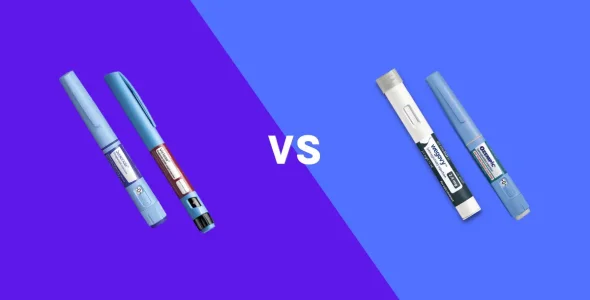Is compounded semaglutide safe? Benefits and risks
Is compounded semaglutide safe to use? We explore the safety concerns and help you weigh the pros and cons.
Key highlights
- Compounded semaglutide is a customized medication made by specialized compounding pharmacies when the drug is in shortage or the patient requires a dosage form or strength that is not commercially available.
- Compounded drugs are generally safe when purchased from a regulated compounding pharmacy. Before purchasing the medication, always verify the accreditation status of pharmacies with the National Association of Pharmacy Boards (NABP).
- Do not purchase compounded semaglutide from unverified online sellers and those who market the product as a miracle drug for weight loss and make exaggerated claims.
- Do not use products made with semaglutide salts, or chemicals used for “for research purpose only” and “not for human consumption” labels as they have unknown ingredients that may be harmful.
- Always consult your doctor before starting compounded semaglutide to discuss whether it is the right choice for you.
Semaglutide is a GLP-1 receptor agonist medication with a 94% structural similarity to the naturally occurring hormone glucagon-like peptide-1. Manufactured by Novo Nordisk, semaglutide is marketed under three brand names: Ozempic, Wegovy, and Rybelsus. Wegovy is FDA-approved for chronic weight management, while Ozempic and Rybelsus are indicated for type 2 diabetes management. Ozempic is also used off-label for weight management.
Compounded drugs are customized formulations prepared by licensed healthcare professionals including physicians and pharmacists. They are prepared by mixing, combining, or altering ingredients of a drug to create a medication tailored to the specific needs of an individual patient when a specific dosage strength or form is not commercially available, or the drug is in shortage.
Compounded semaglutide has gained significant attention lately due to the shortage of brand-name drugs and their high costs. Compounded versions of the drugs are easily accessible and affordable for most patients. An Outsourcing Facilities Association (OFA) report shows that compounding pharmacies filled approximately 80 million prescriptions for compounded semaglutide in the last 12 months.
With the rising popularity of these compounded drugs, many people are wondering if compounded semaglutide is safe. Learn how to ensure safety while purchasing compounded semaglutide, and the benefits, risks, costs, and considerations of using compounded semaglutide.
What is semaglutide?
Manufactured by Novo Nordisk, semaglutide acts as an agonist at the GLP-1 receptor to mimic the action of a natural hormone, glucagon-like peptide-1. GLP-1 regulates hunger and blood sugar levels after you eat food. Semaglutide occupies GLP-1 receptors in the brain to suppress hunger, control blood sugar levels, and promote a feeling of fullness.
Semaglutide works in the following ways:
- Mimics the action of glucagon-like peptide-1 in your brain’s lateral hypothalamus (also called the hunger control center) to suppress appetite and give you a feeling of satiety for a longer time.
- Increases insulin release from the pancreas’ beta cells to control blood sugar levels, which helps with managing type 2 diabetes.
- Semaglutide reduces glucagon production from alpha cells of the pancreas. Glucagon stimulates glucose production in the liver. Lower glucagon decreases glucose production in the liver, which lowers blood glucose levels.
- It slows down the rate of stomach emptying by relaxing the muscles of the stomach. Food moves slowly into the small intestine. It gives you a feeling of satiety for a longer time. You may feel full earlier than usual and experience fewer hunger pangs.
FDA-approved indications
Wegovy
Wegovy is indicated for:
- Chronic weight management in people with obesity (body mass index 30 kg/m² or higher) or overweight (body mass index 27 kg/m² or higher) with at least one weight-related health condition such as high cholesterol levels, hypertension (high blood pressure), heart disease, and type 2 diabetes.
- Reduction of risk of major cardiovascular events in adults with known heart disease.
Ozempic
Ozempic is FDA-approved for:
- Treatment of type 2 diabetes and reducing the risk of major cardiovascular events, including cardiovascular death, nonfatal stroke, and nonfatal myocardial infarction in adults with type 2 diabetes and established cardiovascular disease, when used as an adjunct to exercise and dietary modifications.
- Reducing the risk of worsening kidney disease, kidney failure, and cardiovascular death in patients with chronic kidney disease and type 2 diabetes.
Rybelsus
Rybelsus is the first FDA-approved oral GLP-1 agonist. When combined with exercise and lifestyle changes, it is indicated for promoting blood sugar control in type 2 diabetes patients.
What is compounded semaglutide?
Compounded semaglutide is a custom-made version of semaglutide made by mixing, combining, or altering the ingredients for the individual needs of a patient.
Compounded semaglutide contains the same active ingredient as the FDA-approved brands, Ozempic, Wegovy, and Rybelsus. It is used for chronic weight management in adults with obesity or overweight. It is typically available from compounding pharmacies in various forms including vials with syringes (for injection), dissolvable tablets, and oral drops.
Compounded semaglutide is suitable for patients who need customized medication to fulfill their medical needs. For example, if you are allergic to certain ingredients in Wegovy or Ozempic, you can get compounded semaglutide free of allergens. Moreover, compounded medications have different formulations and strengths that are not available in FDA-approved medications.
What does compounded mean?
Compounding is a practice in which a licensed pharmacist, a healthcare professional, and people working under the direct supervision of licensed pharmacists mix, combine, or alter ingredients of the medication in a state-licensed compounding pharmacy.
Compounded medications fulfill the need for FDA-approved medications during drug shortages to ensure continuity of treatment for patients.
The FDA does not review compounded medications for safety and effectiveness. Compounded medications do not undergo the same rigorous testing and review as FDA-approved medications. State-licensed compounding pharmacies (503A) are regulated by their state board of pharmacy and outsourcing facilities (503B) are regulated by the FDA.
Is compounded semaglutide safe and effective?
Compounded semaglutide is manufactured by FDA-registered outsourced facilities and licensed compounding pharmacies, using the same active ingredient as the brand-name drugs. While this practice is regulated, the FDA does not review compounded semaglutide for its safety and effectiveness.
State boards of pharmacy regulate 503A compounding pharmacies. The rules and regulations for compounding may vary by state. This means all compounding pharmacies do not follow the same rules, and the quality of compounded medications can vary by pharmacy. Some pharmacies are accredited, which means they may follow specific standards.
The FDA directly regulates 503B outsourcing facilities. They are required to register with the FDA and are subject to more stringent requirements and oversight than traditional compounding pharmacies. Outsourcing facilities are required to follow Current Good Manufacturing Practice regulations (CGMP) regulations which are the same standards pharmaceutical manufacturers must meet.
Compounded semaglutide and the FDA
The FDA has not approved compounded semaglutide for weight loss or type 2 diabetes. However, due to drug shortages and individual patient needs that are not commercially available, the FDA allows compounding semaglutide under sections 503A and 503B. The agency allows compounding if the pharmacy meets the following requirements:
- The pharmacy uses the same form (semaglutide base) of semaglutide used in FDA-approved medication.
- The pharmacy purchases semaglutide-based ingredients from FDA-registered facilities.
- It dispenses the medication according to a valid prescription from a licensed healthcare professional.
- The compounding pharmacy dispenses medication following state and federal regulations.
FDA’s recommendations for patients
- To purchase compounded semaglutide, you should have a prescription from a licensed doctor.
- Fill the prescription at a state-licensed pharmacy.
- Use the BeSafeRx tool to safely buy prescription medications.
- Speak to your doctor if you have any questions or concerns.
FDA’s concerns
By Feb 28, 2025, the FDA received 455 reports of adverse events with compounded semaglutide. The agency states that counterfeit drugs claim to be authentic, but they may contain harmful ingredients, too little active ingredient, too much, or no active ingredient at all. These drugs may not be as effective as FDA-approved medications and may contain contaminants.
Benefits of compounded semaglutide
The benefits of compounded semaglutide include the following:
- The medication can be customized into different dosages and formulations for individual patient needs. In comparison, FDA-approved drugs cannot be customized.
- Compounded semaglutide can fulfill the medical needs of patients, such as those with allergies to certain ingredients or sensitivities to the brand name medications.
- Compounded medications are easily available during drug shortages and are affordable for most patients.
Potential risks of compounded semaglutide:
Compounded semaglutide may have the following risks depending on the pharmacy you buy from. You can minimize risks by purchasing from a reputable compounding pharmacy.
Contamination
If the pharmacy does not follow hygienic measures, there is a risk of contamination during the compounding process. It may have other contaminants such as bacteria, fungi, and other medications manufactured in the same pharmacy. These contaminants may cause infections or drug reactions.
Inappropriate ingredients
Some pharmacies sell compounded semaglutide in combination with other ingredients that have not been studied in clinical trials for their safety such as the peptide BPC-157. These extra ingredients can provoke unnecessary immune responses and pose significant safety risks.
Unknown impurities
According to Novo Nordisk’s analysis, compounded semaglutide products contain unknown impurities. Some samples had up to 33% unknown impurities. These impurities can trigger allergic or hypersensitivity reactions after consumption.
Inaccurate dosing
Compounded semaglutide comes in the form of vials, and the dosage is titrated using syringes. There is a risk of underdosing or overdosing during administration of the medication. Overdose can cause hypoglycemia, which may even lead to coma. Similarly, underdosing reduces the effect of the medication.
Variations in quality
The quality of compounded semaglutide can vary depending on the compounding pharmacy and its practices. It may contain too much, too little, or no active ingredient at all. These variations can potentially compromise the safety and effectiveness of the medication.
Adverse reactions and side effects
Generally, the potential side effects of compounded semaglutide are similar to FDA-approved versions. However, compounded semaglutide may have a higher risk of side effects due to potential variations in quality and dosing and the presence of impurities.
Quality control processes
The FDA does not regulate the quality of compounded semaglutide. Each state has its own regulations for compounded medications. The medication may not have the same quality as FDA-approved medications.
Lack of long-term safety data
There is limited long-term safety data on compounded semaglutide, as the medication has not undergone clinical trials. It may cause unknown or delayed adverse effects.
Mitigating the risks of compounded semaglutide
Choosing a reputable pharmacy
Choose a reputable compounding pharmacy that adheres to strict quality control standards. The pharmacy should always require a prescription from a licensed provider as required by law. You can confirm the certification status of pharmacies by following these steps:
- Fill out an online form to the National Association of Boards of Pharmacy (NABP) with the name and location of your chosen pharmacy. They will reply with a detailed report of the certification status of your chosen pharmacy.
- You can use the Pharmacy Compounding Accreditation Board (PCAB) online tool to verify if your selected pharmacy is accredited for compounding.
- You can also contact The Joint Commission to verify the certification status of the pharmacy for compounding.
- You can also review the list of licensed pharmacists in your state who can compound medication by using the Board of Pharmacy Specialists (BPS) online tool.
- Verify the USP-797 compounding certification of pharmacies before purchasing the medication.
Consulting with your doctor
Never start weight loss medications on your own without consulting a healthcare professional. Before making a decision, discuss the benefits and risks of using compounded semaglutide with your healthcare provider. Your doctor can help you weigh the risks and benefits, assess your individual needs, and monitor for potential side effects.
Understanding the medication
Before starting the medication, understand your prescribed dosage, administration instructions, and potential side effects. You can also ask the compounding pharmacist for detailed information and instructions on how to use the medication.
Monitoring for side effects
Be vigilant in monitoring for any potential side effects. Keep a journal or an app to note down all changes. If mild side effects persist or you experience serious side effects, stop taking the medication and consult your healthcare provider before taking the next scheduled dose.
Compounded semaglutide vs. FDA-approved semaglutide (Ozempic and Wegovy)
The following are key differences between FDA-approved semaglutide and compounded semaglutide:
Safety, testing, and approval
Wegovy, Ozempic, and Rybelsus are FDA-approved brands of semaglutide. They are reviewed and tested by the FDA for safety and effectiveness. In comparison, compounded semaglutide does not undergo the same rigorous testing and review by the FDA.
Ingredients
Compounded semaglutide may have extra ingredients, such as vitamin B12 and BPC-157, which are not present in Wegovy and Ozempic. There may be changes in the quantity of active and inactive ingredients. Some pharmacies use semaglutide salts, such as semaglutide sodium and semaglutide acetate, which are not safe.
Dosage forms
Ozempic and Wegovy are injectables administered subcutaneously (under the skin). Rybelsus comes in the form of oral tablets. Compounded semaglutide comes in the following forms:
- Orally disintegrating tablets
- Oral capsules/tablets
- Injections
- Nasal sprays
- Sublingual drops (used under the tongue)
Medication storage and delivery
FDA-approved versions of semaglutide are available as prefilled injections with pre-metered doses. Compounded semaglutide usually comes in vials and you have to draw your calculated dose with a syringe.
Who should consider compounded semaglutide?
Compounded semaglutide is generally recommended for patients with specific needs not met by commercially available products. For example, if a patient is allergic to a certain ingredient in brand-name semaglutide, healthcare professionals prescribe allergen-free compounded semaglutide. If the patient is sensitive to side effects, healthcare professionals can prescribe lower doses than the brand-name medication.
The FDA allows compounding medications under sections 503A and 503B in case of drug shortages. You can also use compounded semaglutide during a shortage of Ozempic and Wegovy. Compounded semaglutide is easily accessible in all states via online pharmacies and telehealth providers. Remember to purchase the medication from FDA-registered or state-licensed compounding pharmacies to ensure its safety and effectiveness.
Always consult a healthcare provider before starting compounded semaglutide. They will assess your medical history and individual needs when prescribing the medication.
Like branded semaglutide, compounded semaglutide is prescribed for managing chronic weight in obese and overweight adults and type 2 diabetes when paired with exercise and a reduced-calorie diet. However, compounded semaglutide is not FDA-approved like the brand name drugs.
How to safely access compounded semaglutide
Before purchasing compounded semaglutide, choose a licensed, U.S.-certified, and reputable pharmacy. You can verify the accreditation of pharmacies with the National Association of Boards of Pharmacy (NABP). You can also use the FDA’s BeSafeRx tool to check whether the pharmacy is licensed.
The FDA recommends purchasing compounded medications from a state-licensed pharmacy or an outsourcing facility registered with the FDA, with a prescription from a licensed healthcare provider.
You can ask the following questions from your healthcare provider or pharmacist about compounded semaglutide:
- What is compounded semaglutide, and how does it work?
- What benefits can I expect from using it?
- How does it differ from the FDA-approved version?
- What side effects should I watch for, and how can I manage them?
- How long will I need to take it, and when will I see results?
- Do any of my other health conditions or medications make the medication unsafe for me?
- What is the correct dosage and administration schedule?
- How should I store the medication?
- How will my progress be monitored?
- Do I need any lifestyle or dietary changes?
- What should I do if I miss a dose or take too much?
- Can I take it with my current medications?
- Are there other treatment options I should consider?
- What should I do if I experience mild or severe side effects?
- How will this affect my long-term health?
- How can I tell if it’s not working for me?
Red flags to watch out for
Look for these red flags when purchasing compounded semaglutide:
- Do not purchase from pharmacies that do not require a prescription. They may be selling unauthorized or counterfeit medications.
- Be cautious of online pharmacies offering prices far below the standard market rate. Such products are often counterfeit, may contain harmful substances, or may not include semaglutide at all.
- Do not purchase products labeled “for research use only” or “not for human consumption.” These are not intended or approved for personal use and may pose serious health risks.
- Avoid medications with packaging that does not list its ingredients. They may contain unknown harmful ingredients.
- Platforms that promote semaglutide as a “miracle” weight loss solution or make exaggerated health claims are more likely to be fake.
- Do not buy from pharmacies or telehealth platforms that don’t have a clear cancellation or refund policy. Reputable providers will always have these policies publicly available.
Compounded semaglutide side effects
Common and serious side effects of semaglutide include:
Common side effects
The most common side effects of compounded semaglutide are similar to Wegovy and Ozempic. These include:
- Nausea
- Abdominal discomfort
- Stomach problems
- Constipation
- Vomiting
- Diarrhea
Serious side effects
Serious side effects of compounded semaglutide can include the following:
- Severe stomach problems
- Changes in vision (due to diabetic retinopathy)
- Acute pancreatitis
- Gallbladder problems
- Hypersensitivity/allergic reaction
- Hypoglycemia (low blood sugar levels)
- Mood and behavioral changes
- Suicidal ideation
- Acute kidney injury
- Increased risk of aspiration in anesthesia and sedation
Novo Nordisk issued a warning stating that compounded semaglutide containing peptide-related impurities may stimulate an immune reaction upon repeated injections, which can result in serious and life-threatening reactions such as anaphylaxis for patients.
In a clinical study of rodents, semaglutide showed an increased risk of thyroid cancers. It is still unclear if compounded semaglutide causes the same effect in humans, as the medication has not been studied in patients with thyroid tumors. However, the medication has a boxed warning for patients with a history of medullary thyroid cancer (MTC) and MEN 2 syndrome (multiple endocrine neoplasia syndrome type 2). Compounded semaglutide is not safe for pregnant and breastfeeding women and children.
Like Ozempic and Wegovy, mild side effects of compounded semaglutide usually subside over time. If you experience serious side effects such as allergic or hypersensitivity reactions and severe hypoglycemia (which can lead to coma), immediately visit a nearby healthcare facility. Do not take the next dosage before seeking medical advice from your doctor.
Alternatives to compounded semaglutide
You can try the following alternatives to compounded semaglutide after consulting with a licensed healthcare professional:
- FDA-approved semaglutide brand names, such as Ozempic, Wegovy, and Rybelsus. If eligible, you can buy these medications at discounted prices by using the manufacturer savings cards or possibly get Ozempic or Rybelsus for free through the Novo Nordisk patient assistance program.
- Liraglutide (Saxenda and Victoza) and dulaglutide are GLP-1 receptor agonists that have the same mechanism of action as semaglutide. Liraglutide is currently available as a generic with additional cost savings.
- Zepbound and Mounjaro (tirzepatide) are GLP-1 and GIP receptor agonist medications. They can also be considered as an alternative to semaglutide for weight loss and type 2 diabetes management. The manufacturer’s savings card programs can also help lower the cost of these medications.
- You can also try non-pharmacological interventions, such as lifestyle changes, increased physical activity, a reduced-calorie diet, and exercise, to manage diabetes and weight.
Compounded semaglutide FAQs
Is compounded semaglutide legal?
Compounded semaglutide is legal to dispense and distribute, provided the pharmacy meets compounding requirements set by the state board of pharmacy or FDA.
How much does compounded semaglutide cost compared to Ozempic or Wegovy?
Compounded semaglutide typically costs $200 to $300 per month. In comparison, Ozempic and Wegovy cost $1,000 to $1,300 for a monthly supply.
Can compounded semaglutide be used for weight loss?
Compounded semaglutide can be used for weight loss in patients with obesity (body mass index 30 kg/m² or more) and overweight (body mass index 27 kg/m² or more) with at least one weight-related health condition such as hypertension, heart disease, high cholesterol levels, and type 2 diabetes, when used as an adjunct to dietary modifications and increased physical activity.
What are the potential side effects of compounded semaglutide?
The potential side effects of compounded semaglutide include nausea, abdominal discomfort, vomiting, diarrhea, and constipation. Serious side effects include changes in vision, mood and behavioural changes, acute kidney injury, hypersensitivity reaction, and low blood glucose levels.
How do I know if a compounding pharmacy is reputable?
The compounding pharmacy is reputable if the pharmacy:
- Requires a valid prescription from a licensed healthcare professional
- Follows quality control measures
- Is U.S.-certified for compounding
- Is accredited by the National Association of Pharmacy Boards (NABP)
- Is included in the FDA’s list of outsourcing facilities.
How can I find a reputable compounding pharmacy?
You can find a reputable compounding pharmacy by using the FDA’s BeSafeRx tool, or you can check the accreditation of the compounding pharmacy with the National Association of Boards of Pharmacy (NABP). Moreover, your healthcare professional can also recommend a good pharmacy.
What should I do if I experience side effects from compounded semaglutide?
Mild side effects of compounded semaglutide usually subside over time. If they persist or you experience serious side effects, consult your doctor before taking the next dose. They may adjust the dosage of the medication. In case of allergic reaction or severe hypoglycemia (low blood sugar levels), immediately consult a nearby healthcare facility to seek emergency care.
Does insurance cover compounded semaglutide?
Most insurance companies do not cover compounded semaglutide as it is not approved by the FDA. It is recommended to verify with your insurance provider if they offer coverage for compounded medications.
Bottom line
Compounded semaglutide is considered to be safe when manufactured by a reputable, U.S.-licensed compounding pharmacy.
If you’re considering compounded semaglutide, consult an authorized healthcare provider. Talk to your doctor about the potential risks and benefits and whether it’s the right choice for you before starting compounded semaglutide. They will assess your medical history and determine if the medication is right for you.







